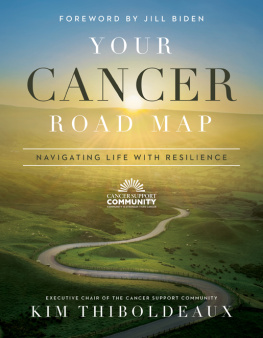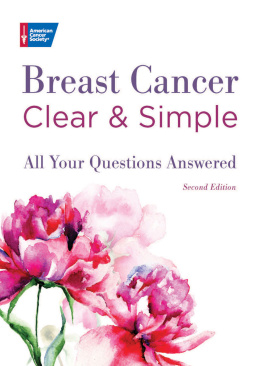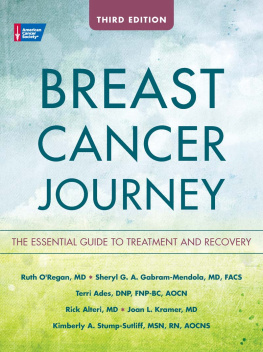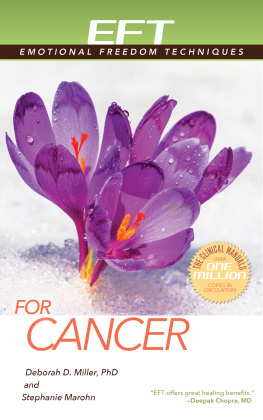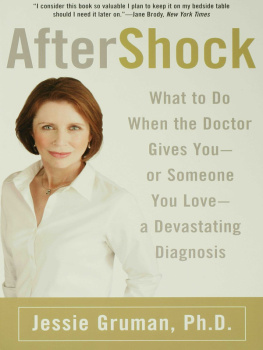About the Book
r eclaiming Your Life After Diagnosis is packed with all of the most important information and resources to get you or someone you love through the challenging journey of a cancer diagnosis, treatment, and beyond. Backed by the Cancer Support Community (www.cancersupportcommunity.org), one of the largest, most respected cancer organizations in the world, this one book tells you everything you need to know to address your physical, emotional, financial, social, and practical needs.
Complete with Patient Action Plans detailing actions you can take each step of the way, Reclaiming Your Life After Diagnosis allows you to empower yourself to become actively involved in your treatment and long-term well-being. Find out how to
put a strong support and resource team in place to buffer against the challenges of diagnosis, treatment, and survivorship;
educate yourself on different treatments and identify, with the help of your doctor, what treatment plan is right for you;
develop practical, more effective ways to manage side effects;
deal with complex emotional issues ranging from the shock of initial diagnosis to creating a living legacy and a meaning-filled life.
With powerful stories from real patients and survivors, evidence-based research, and the best treatment and support information available, Reclaiming Your Life After Diagnosis will help you develop the strength you need to stay focused on healingto live longer and better.
PRAISE FOR
Reclaiming Your Life After Diagnosis
Reclaiming Your Life After Diagnosis is the most recent achievement (of many) of the Cancer Support Community: an authentic how to cope handbook for patients with cancer. This new access to thoughtful, clear advice for use during the crisis of cancer treatment is a great gift. These experts provide accurate information but importantly, it is given in the context of genuinely caring for the reader who is ill.
JIMMIE C. HOLLAND, MD,
Memorial Sloan-Kettering Cancer Center
Reclaiming Your Life After Diagnosis brings clear information, comfort, and hope to people with cancer and their loved ones.
FORMER U.S. FIRST LADY ROSALYNN CARTER
I wish the Cancer Support Community had been around when I was battling cancer and that this guide had been available to me and my family. Thank goodness this crucial resource exists today for the millions of people impacted by cancer.
TED KENNEDY, JR.,
childhood cancer survivor
The Cancer Support Community continues to excel at reaching out to cancer patients. Reclaiming Your Life After Diagnosis is a must-have for all cancer patients and their loved ones.
PAUL MOLITOR,
2004 National Baseball Hall of Fame Inductee,
Family Caregiver to His Father When He Was Battling Cancer
reclaiming
your life
after
diagnosis
The Cancer Support
Community Handbook
CANCER SUPPORT COMMUNITY
Kim Thiboldeaux
President and CEO
AND Mitch Golant, PhD
Senior Vice President of Research and Training

2007, 2012 by the Cancer Support Community
All rights reserved. No part of this book may be used or reproduced in any manner whatsoever without written permission except in the case of brief quotations embodied in critical articles or reviews.
This publication is designed to provide accurate and authoritative information in regard to the subject matter covered. It is sold with the understanding that the publisher is not engaged in rendering medical, legal, or other professional services. If medical advice or other professional assistance is required, the services of a competent professional person should be sought.
Adapted from a Declaration of Principles jointly adopted by a committee of the American Bar Association and a Committee of Publishers and Associations

BenBella Books, Inc.
10300 N. Central Expy, Suite 400
Dallas, TX 75231
www.benbellabooks.com
Send feedback to
10 9 8 7 6 5 4 3 2 1
Library of Congress Cataloging-in-Publication Data
Thiboldeaux, Kim.
Reclaiming Your Life After Diagnosis: The Cancer Support Community Handbook / by Kim Thiboldeaux, and Mitch Golant.
p. cm.
ISBN 978-1-936661-87-9
1. CancerPopular works. 2. CancerPsychological aspects. I. Golant, Mitch. II. Title.
RC263.T45 2007
616.994dc22
2007006819
Editing by Dorianne R. Perrucci
Copyediting by Laura Kidder
Proofreading by Cape Cod Compositors and Brittany Dowdle
Cover design by Allison Bard
Photo of Kim Thiboldeaux by Connie Reider
Photo of Mitch Golant by Lee Moskow
Text design and composition by John Reinhardt Book Design
This book is dedicated to the memory of our dear friends and late founders of The Wellness Community, Dr. Harold Benjamin and his wife Harriet Benjamin, and to the vision of the founder of Gildas Club, Joanna Bull, MA, MFCC. We are so pleased that these two legacy organizations, The Wellness Community and Gildas Club Worldwide, have joined forces to become the Cancer Support Community.
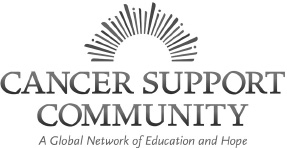
Contents
t he news about cancer is better than ever. Even though more people are being diagnosed, fewer people are dying from the disease, and people are living longer and better with cancer. Theyre also learning how to live well with, through, and beyond it.
In the last twenty-five years, there have been dramatic advances in the diagnosis and treatment of cancer. These advances across most cancers have resulted in improved outcomes, leading to larger numbers than ever before of disease-free, long-term survivors, as well as prolonged survival for those who have developed metastatic disease.
But as the number of those living with cancer rises, so does the burden on the health care system. As a result, patients are finding themselves in the position of having to take control of their own care plans. In essence, they have become empowered health care consumers. In a New York Times/CBS News poll of 1,111 adults in February 2005, 44 percent of patients who received a diagnosis sought more information about treatment options from sources who were not their physiciansincluding the Internet, friends, relatives, and even other doctors. Slightly more than half of surveyed patients who received a diagnosis were given multiple treatment optionsand one-third made the decision on their own. Those between 45 and 64 years old were most likely to take their medical care into their own hands by making informed, educated decisions about their treatments.
Next page

